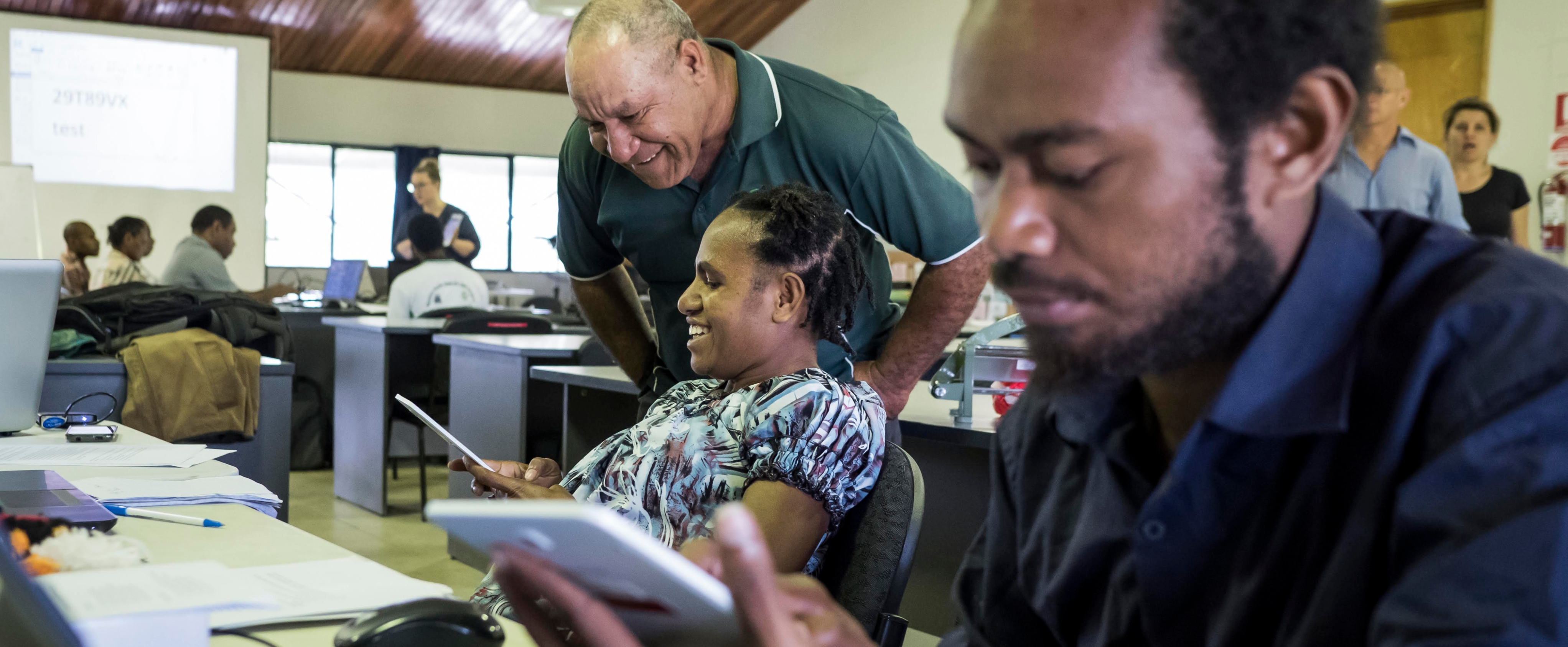Adopting Mobile Acquired Data requires staff and managers to build new technical skills and knowledge. Importantly, successful use of mobile acquired data requires upskilling staff at all levels of a project or organisation (i.e. from directors and managers through to field staff). During the MAD Research Series, Oikoi delivered several types of training to different levels of the partner institutions. These included:
- CommCare App Building (introductory)
- CommCare App Building (advanced)
- Enumerator / field worker training
- Institutional training
These trainings were mostly delivered as multi-day workshops and varied in breadth and depth. In some training workshops, a small number of people were trained in sessions that covered greater depth of content. In others, a greater number of people were trained but the sessions were not designed to upskill trainees to the same degree.
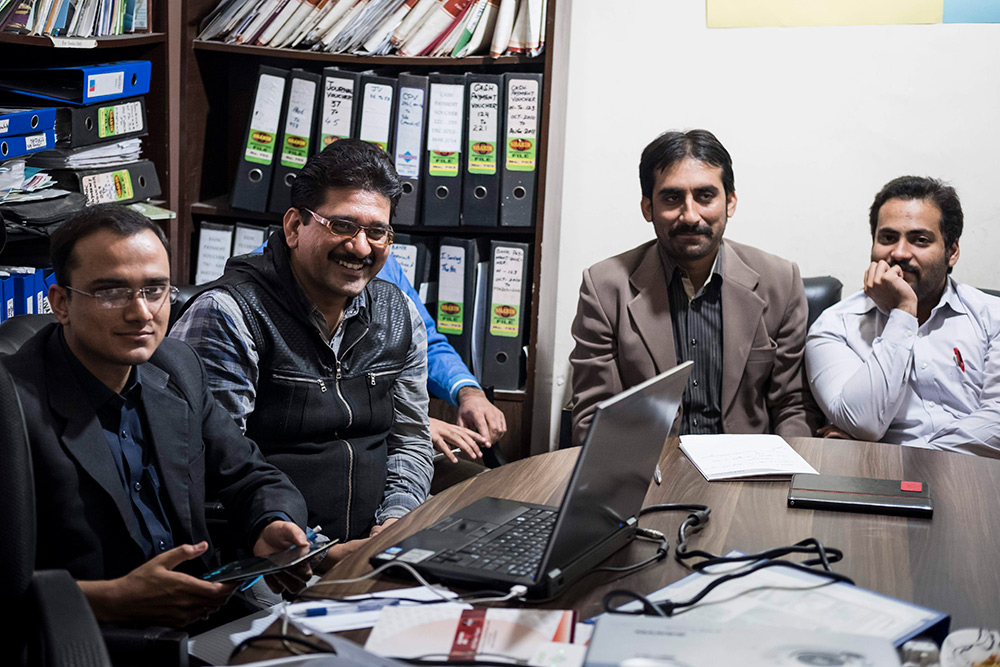
Training in CommCare App building
The MAD Research Series showed that projects using mobile acquired data generally needed a dedicated app manager who could lead the app building directly. Even when app development was contracted to a third party, the project still required someone who had been trained to a basic level in app development. This allowed the app manager to liaise with the developers and even to directly fix minor bugs during fieldwork. With basic training, app managers could also explain the more complex bugs to third party developers, monitoring incoming data and creating data exports as required by the wider research team.
You can access presentations on CommCare App Building in the Resources page
Introduction to App building
Oikoi developed a 2-day App Building training curriculum based around the Dimagi Academy’s CommCare Application Building course. Trainees were instructed to take themselves through Dimagi’s CommCare Fundamentals course ahead of the training. The first day of training focused on introducing CommCare and its features, downloading the app to mobile devices, and beginning to look at using the form builder. The second day involved learning about app structure, configuring app settings, trainees building their first forms, introducing case management features and deploying an app. Where available, additional days were spent working specifically on developing the particular app needed by the trainee team.
In most cases, this app building training was delivered to a small group of trainees as an intensive session, and this generally led to sufficient trainee knowledge to allow individuals to build their first apps. In some instances, app building training was delivered to a larger group but served as an introduction to the technology due to the group size. These broader introductory trainings were found to be less effective in upskilling individuals to become app builders.
Advanced App building features
Some groups in the MAD Research Series requested follow up training from Oikoi to help their App Builders master more advanced features of the CommCare platform. In these sessions, Oikoi introduced more complex features such as repeat groups and lookup tables, advanced case management, creating custom data exports and excel dashboards. Groups receiving advanced training included the International Rice Research Institute (IRRI).
Training enumerators
Oikoi developed a 2-day enumerator training for mobile acquired data, delivered as an extension to more general training on question delivery that utilised a paper version of the survey. The first morning focused on familiarity with the devices and their basic functions, protocols for device use in the field and general CommCare navigation. Both afternoons were reserved for role play with the application. The second day covered essential troubleshooting and allowed the enumerators to provide feedback on the application. Where possible the second day would include a short field visit to test the application with a real respondent. Sufficient enumerator training was identified as a key factor for successful implementations.
Training institutions
While the technical support was a critical foundation for MAD implementation, staff that had the greatest success also received strong support from their managers and institutions.
The intensive institutional training provided to NARI and IRRI staff resulted in much better adoption of MAD technologies in non-ACIAR projects. Both institutions embraced the technology and are now active champions of its use. Part of this success was due to the involvement of institutional management (as well as app builders) to ensure adoption decision makers are ‘in the room’ and understand the value of the technology and take advantage of their newfound capacity. The success of these institutional arrangements influenced the work in scaling MAD in Pakistan through the AVCCR program. The outcomes from these two efforts suggest that by targeting key research institutions and providing in-depth staff training, MAD technologies can be successfully scaled-out.
In the first instance, capacity building was most successful when the staff selected for training were themselves enthusiastic about MAD activities. This was usually the case when management were engaged with the broader MAD agenda and took steps to properly consider which staff were most suited or best placed to quickly learn and implement MAD skills. The staff also tended to respond better when they were given a sense that institutional management would be responsive to their new skillset.
Institutional support was also critical in allowing the staff time for MAD activities. Staff needed permission to attend training or build their applications. Training could only take place when adequate venues and devices were provided, requiring logistical support from project management. In one case, the allotted second training for staff did not occur only because project management did not respond to requests from Oikoi to decide on training details. This exemplified the importance of institutional and managerial support in MAD implementation. Projects with management and institutions that are genuinely interested and engaged in MAD implementation will achieve great success where others will not. Securing this level of institutional support can be achieved through ‘institutional level’ training that involves directors, managers and decision makers. These sessions are important for socialising the technology and outlining its cross-departmental and cross-discipline benefits. These trainings were provided with great success to the National Agricultural Research Institute in Papua New Guinea and the International Rice Research Institute. In both cases, these institutions made great use of their new app builders in activities outside of the initial MAD Research Series work.
NARI PNG
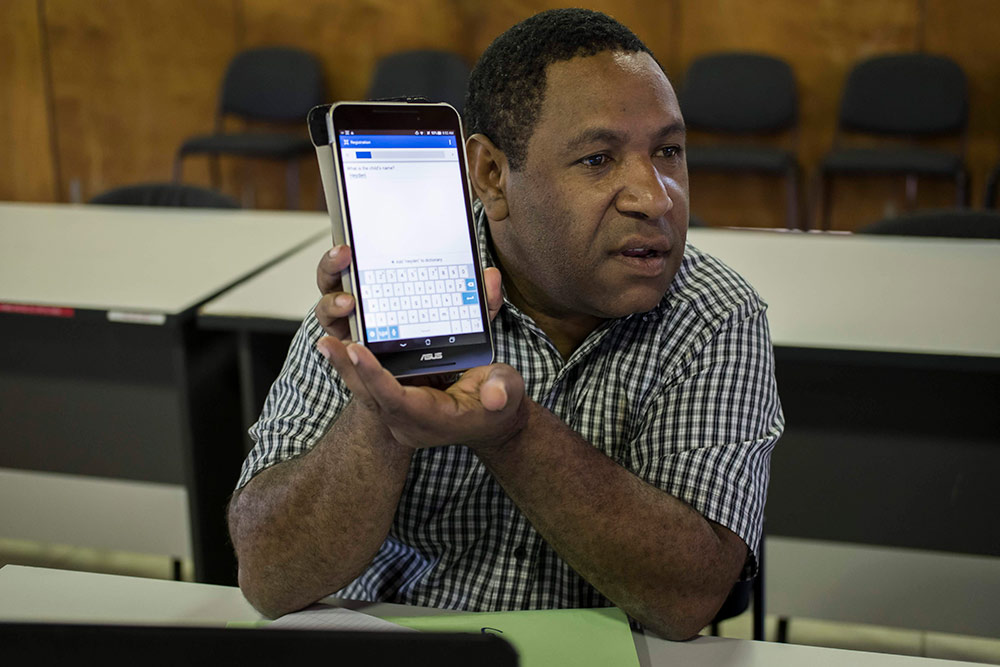
The Oikoi team delivered institutional-level training to PNG’s National Agricultural Research Institute (NARI) as part of MAD 4 TADEP project. As a format, these workshops had few attendees, but allowed for greater depth of training to be provided. Oikoi provided an ACIAR-tailored CommCare certification process for NARI. This involved face to face learning by building agriculture-oriented sample applications complemented by some theory. This was concluded with a capstone exercise where the candidates could build an application of their own design with immediate application to their current assigned projects.
The NARI institutional training (held over two workshops) was aimed to enhance the CommCare capacity being developed through individual training to TADEP projects. The Family Teams, Canarium and Sweet Potato projects all expressed a strong desire that training include members of their partner organisation, NARI. TADEP projects that did not have NARI as a partner organisation (Bougainville Cocoa and PNG Cocoa) also agreed that a resource pool of this nature would be valuable. The training was delivered to five NARI staff members:
- Jeromy Kavi, Junior Social Scientist
- Elly Solomon, Junior Livestock Scientist
- Raywin Ovah, Junior Economist
- Isidora Ramita, Junior Postharvest Scientist
- Seniorl Anzu, Communications Officer
The first NARI training session was held over four days in November 2016. This workshop included introduction to CommCare and building individual apps (50% complete by the end of the training). The second training (also four days) included revision of concepts before completing application building. Finally, the NARI staff were guided in how to train other staff in application use and monitoring data during collection.
This NARI training led to adoption of CommCare in two separate NARI projects (one funded by the European Union and another by the UN Development Programme). One NARI staff member trained in these workshops (Jeromy Kavi) successfully assisted the Family Teams project in their MAD implementation. NARI director Dr Sim Sar subsequently began internal discussions in the organisation about how to scale out MAD adoption in the institution and that the trainees were included in these discussions.
IRRI
The first, short CommCare training for the Myanmar Rice team in Yangon encouraged the researchers to request additional training for the team at the International Rice Research Institute headquarters in the Philippines. Eight women researchers from all disciplines were involved in the first comprehensive 5-day basic CommCare training, during which they each began work on an application relevant to their specific studies with the assistance of the trainer. Several of these staff completed their applications and used them in other IRRI projects. A second 5-day training on advanced topics with a focus on adding more sophisticated functionality to the MyRice endline survey and troubleshooting issues the app builders were experiencing was held later in 2017. As a result IRRI now boasts several accomplished CommCare app builders and the ability to develop complex digital tools for their projects (at the last report 11 applications had been developed). They have also provided enumerator training and basic app builder training to their partner organisation, the Department of Agriculture in Myanmar.


